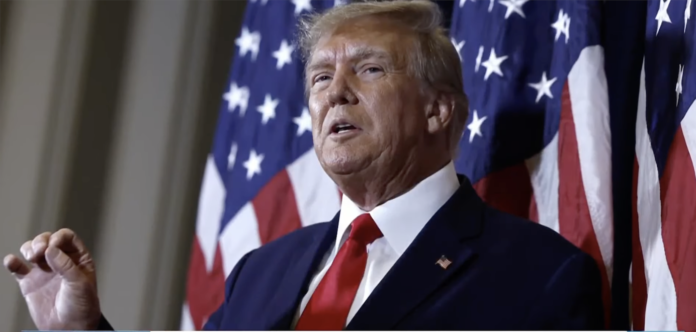NEW YORK: A Manhattan grand jury has charged Donald Trump, bringing to sudden end years of inquiries into his personal, political, and economic dealings and striking a severe blow to his campaign to recapture the White House.

The charges, which arise from payments made during the 2016 presidential campaign to stifle claims of an illicit sexual encounter, were unclear on Friday since the indictment was still sealed. According to prosecutors, plans are being made to coordinate Trump’s possible surrender early next week. In the case of a conviction, they did not state whether they intended to seek prison time; however, this development would not bar Trump from running for and winning the presidency.
The indictment, the first against a former president of the United States, thrusts a local district attorney’s office into the middle of a presidential election and starts legal processes in the city where the former president lived for many years. The accusations, which come at a time of intense political division, are likely to reinforce rather than reshape the opposing viewpoints of those who believe that accountability is long overdue and those who, like Trump, consider that a Democratic prosecutor is singling out the Republican for political reasons.
Trump, who has constantly criticized the inquiry and denied any wrongdoing, termed the charge “political persecution” and predicted it will hurt Democrats in the year 2024. Defense attorneys Susan Necheles and Joe Tacopina said in a statement announcing the accusations that Trump “did not commit any crime. In court, we will vigorously contest this political prosecution.
The Manhattan district attorney’s office confirmed the indictment through a spokeswoman, who claimed prosecutors had contacted Trump’s legal team to arrange a surrender. Trump is “likely” to turn himself in on Tuesday, according to Tacopina.
Despite being requested to turn himself in on Friday, Trump’s lawyers argued that the Secret Service needed more time to make security arrangements, according to two individuals familiar with the situation who spoke to The Associated Press. They requested anonymity since they were unable to discuss security matters publicly.
Alvin Bragg, the district attorney, left his office that evening without making any remarks.
The case focused on well-documented allegations from 2016 when Trump’s desire to run for office and his background as a celebrity intersected. Authorities spent months looking into the money given to Stormy Daniels, a porn star, and Karen McDougal, a former Playboy model, whom he believed might come forward with charges that they had extramarital affairs with him.
Officials of the Trump campaign were surprised by the indictment’s timing after reading press stories that suggested that criminal charges were probably still weeks away. On Thursday, the former president was at his Florida resort, Mar-a-Lago, where he had recorded an interview with a conservative commentator earlier that day.
The indictment sets up yet another never-before-seen spectacle for a guy whose presidency was marked by one broken rule after another: a former president getting his fingerprints and mug shot taken before being arraigned. His booking is anticipated to be meticulously planned for security purposes to prevent crowds inside or outside the courthouse.
The prosecution also means that Trump will have to defend his political future and his freedom while fending off potentially more dangerous legal threats, such as inquiries into his and his allies’ attempts to rig the 2020 presidential election and their storage of hundreds of hundreds of classified documents.
In fact, until recently, it was believed that New York was an unlikely candidate to bring charges against Trump first, who is still under investigation in Washington and Atlanta. In contrast to earlier studies, the Manhattan case focuses on accusations made against Trump before he was elected president and is unrelated to his widely-publicized attempts to rig the election.
The indictment comes when Trump tries to regain control of the Republican Party and fend off many former loyalists who might endanger his chances of winning the nomination. Florida Governor Ron DeSantis, a presumed front-runner in the race, called the indictment “un-American” in a statement Thursday night that purposefully omitted Trump’s name.
The Manhattan district attorney, Ramos, is pursuing the charges after two prior teams of prosecutors looked into the unusual case but decided against taking the potentially divisive step of seeking Trump’s indictment. The evidence of a key witness, Michael Cohen, Trump’s former attorney and fixer, who pled guilty to federal crimes related to the hush money payments, including making false statements, may also play a role in the outcome of the case.
Until news broke in early March that Bragg had asked Trump to testify before a grand jury, indicating that prosecutors were near to filing charges, the investigation’s future appeared uncertain.
Trump’s legal team denied the offer, but a Trump-affiliated attorney gave a brief testimony to doubt Cohen’s reliability.
Trump predicted an impending arrest and called for protests in a message he released earlier this month, which increased speculation that he would soon be prosecuted. In a new statement on Thursday, he did not reiterate that appeal. Still, the New York Police Department instructed its 36,000 officers to be completely mobilized and prepared to deal with potential demonstrations or unrest.








